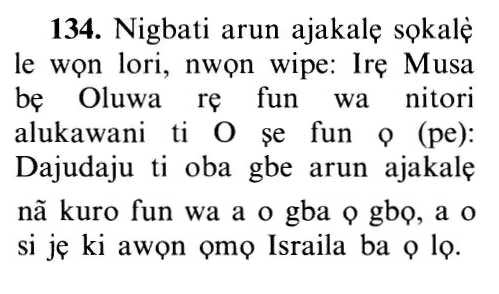7vs134
Select any filter and click on Go! to see results
وَلَمَّا وَقَعَ عَلَيْهِمُ الرِّجْزُ قَالُواْ يَا مُوسَى ادْعُ لَنَا رَبَّكَ بِمَا عَهِدَ عِندَكَ لَئِن كَشَفْتَ عَنَّا الرِّجْزَ لَنُؤْمِنَنَّ لَكَ وَلَنُرْسِلَنَّ مَعَكَ بَنِي إِسْرَائِيلَ
Walamma waqaAAa AAalayhimu alrrijzu qaloo ya moosa odAAu lana rabbaka bima AAahida AAindaka lain kashafta AAanna alrrijza lanuminanna laka walanursilanna maAAaka banee israeela
Index Terms
Click to play
Yoruba Translation

Hausa Translation
Kuma a lõkacin da masĩfa ta auku a kansu, sukan ce: "Yã Mũsã! Ka rõƙa mana Ubangijinka, sabõda abin da Ya yi alkwari a wurinka, lalle ne idan ka kau da azãbar daga barinmu, haƙĩƙa Munã ĩmãni sabõda kai, kuma munã sakin Banĩ Isrã´ila tare da kai."
Asbabu n-Nuzuul (Occasions of Revelation)
وَلَمَّا وَقَعَ عَلَيْهِمُ الرِّجْزُ ...
And when the punishment struck them,
They became hungry. This is when,
... قَالُواْ يَا مُوسَى ادْعُ لَنَا رَبَّكَ بِمَا عَهِدَ عِندَكَ لَئِن كَشَفْتَ عَنَّا الرِّجْزَ لَنُؤْمِنَنَّ لَكَ وَلَنُرْسِلَنَّ مَعَكَ بَنِي إِسْرَآئِيلَ ﴿١٣٤﴾
They said: "O Musa! Invoke your Lord for us because of His promise to you. If you remove the punishment from us, we indeed shall believe in you, and we shall let the Children of Israel go with you.''
Musa invoked his Lord and He removed the affliction from them, but they did not keep their promises. So Allah sent locusts that ate the trees and consumed the nails on their doors, until the doors fell from their homes and residences.
They again said what they said to Musa before, and he called on his Lord and He removed the affliction. Still, they did not keep their promises, and Allah sent the Qummal.
Musa, peace be upon him, was commanded to go to a mound and strike it with his staff. So Musa went to a huge mound, struck it with his staff and the Qummal fell out of it in tremendous numbers, until they overwhelmed the houses and food reserves, ultimately depriving them of sleep and rest. When they suffered under this affliction, they said similar to what they said before, and Musa invoked his Lord and He removed the affliction.
They did not keep their promise and Allah sent the frogs to them, and they filled the houses, foods and pots. One of them would not pick up a piece of clothing, or uncover some food, without finding frogs in it. When this affliction became hard on them, they made similar promises as before, Musa supplicated to his Lord and Allah removed the affliction.
They did not keep any of the promises they made, and Allah sent the blood, and the waters of the people of Fir`awn turned to blood. Any water they collected from a well, a river, or a container, turned to blood.''
فأرسل الطوفان وهو الماء ففاض على وجه الأرض ثم ركد لا يقدرون على أن يحرثوا ولا أن يعملوا شيئا حتى جهدوا جوعا فلما بلغهم ذلك " قالوا يا موسى ادع لنا ربك بما عهد عندك لئن كشفت عنا الرجز لنؤمنن لك ولنرسلن معك بني إسرائيل " فدعا موسى ربه.
"ولما وقع عليهم الرجز" العذاب "قالوا يا موسى ادع لنا ربك بما عهد عندك" من كشف العذاب عنا إن آمنا "لئن" لام قسم
" الرجز " أي العذاب . وقرئ بضم الراء , لغتان . قال ابن جبير : كان طاعونا مات به من القبط في يوم واحد سبعون ألفا . وقيل : المراد بالرجز ما تقدم ذكره من الآيات .
I'raab - grammatical analysis of the Qur'an
«وَلَمَّا» ظرفية شرطية والواو عاطفة.
«وَقَعَ عَلَيْهِمُ الرِّجْزُ» فعل ماض تعلق به الجار والمجرور والرجز فاعله ، والجملة في محل جر بالإضافة. جملة «قالُوا» لا محل لها جواب لما. «يا مُوسَى» منادى مفرد علم مبني على الضم في محل نصب.
«ادْعُ لَنا رَبَّكَ» فعل أمر مبني على حذف حرف العلة ، تعلق به الجار والمجرور والفاعل أنت «لَنا» ، «رَبَّكَ» مفعوله ، والكاف مضاف إليه.
«بِما» مصدرية مؤولة بمصدر في محل جر بالباء ، والجار والمجرور متعلقان بالفعل ادع. أو ما موصولية.
«عَهِدَ» الجملة صلة.
«عِنْدَكَ» ظرف مكان متعلق بالفعل عهد.
«لَئِنْ» اللام موطئة للقسم إن حرف شرط جازم.
«كَشَفْتَ» فعل ماض وفاعل ، «الرِّجْزُ» مفعول به.
«عَنَّا» متعلقان بكشف.
«الرِّجْزُ» مفعول به.
«لَنُؤْمِنَنَّ» فعل مضارع مبني على الفتح لاتصاله بنون التوكيد الثقيلة وفاعله نحن واللام واقعة في جواب القسم.
«لَكَ» متعلقان بالفعل قبلهما والجملة واقعة في جواب القسم. وجملة كشف ابتدائية لا محل لها ، وجملة «لَنُرْسِلَنَّ» معطوفة على ما قبلها.
«مَعَكَ» ظرف والكاف مضاف إليه.
«بَنِي» مفعول به منصوب وعلامة نصبه الياء لأنه ملحق بجمع المذكر السالم ، وحذفت النون للإضافة.
«إِسْرائِيلَ» مضاف إليه مجرور بالفتحة.
